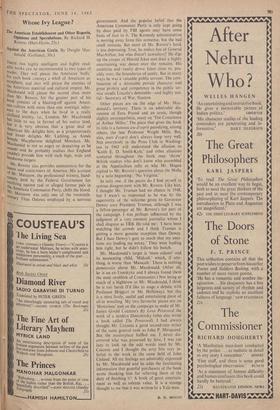Whose Ivy League?
The American Establishment and Other Reports, Opinions and Speculations. By Richard H. Rovere. (Hart-Davis, 25s.) Against the American Grain, By Dwight Mac-
Masa two highly intelligent and highly read- able books can be recommended to two types of reader. They will please the American 'buffs,' for each book conveys a whiff of American at- mosphere, and ihey will please the enemies of the American material and cultural empire. Mr. Macdonald will please the second class more than Mr. Rovere, for the greater part of his book consists of a blasting-off against Ameri- can culture with more than one nostalgic refer- ence to the days when he lived in a really c'vihsed society, i.e., London. Mr. Macdonald has little to say in favour of his native land, but it is very obvious that a great deal of _American life delights him, as a preposterously ad boxer delights Mr. Liebling, as Aimee sh Macdonald Macpherson delighted Mencken. Mr. macdonald is not as angry or despairing as he s(Mnds and he probably realises that England e,ouldaa provide him with such high, wide and handsome targets. , Mr.- Rovere also provides ammunition for the 1 haters and contemners of America. His account f s Mr. Matusow, the professional witness, hand- iteclMelY paid by the Federal Government for stifYing against real or alleged former pals in the Communist Party, chills the blood. "I Matusow was only one of the twentieth- eellturY Titus Oateses employed by a nervous
government. And the popular belief that the American Communist Party is only kept going by dues paid by FBI agents may have some basis of fact to it. The Kennedy administration is moving away from this nonsense, but the bad smell remains. But most of Mr. Rovere's book is less depressing. True, he makes fun of General MacArthur, but who doesn't nowadays He He digs up the corpse of Harold Ickes and does a highly entertaining war dance over the remains. His ambition and vanity drove Ickes close to, pos- sibly over, the boundaries of sanity. But in many ways he was a valuable public servant. The com- bination of a detestable private character and great probity and competence in the public ser- vice recalls Lincoln's detestable—and highly use- ful—Secretary of War, Stanton.
Other pieces are on the edge of Mr. Mac- donald's territory. There is an admirable dis- cussion of Ezra Pound and an acute, though slightly unsympathetic, essay on 'The Conscience of Arthur Miller.' The piece that gives the book its title is a famous jeu desprit parodying, among others, the late Professor Wright Mills. But, alas, jeux d'esprit don't always keep very well. Not everybody in the Press Club in Washing- ton in 1963 will understand the allusion to 'Keith E. D. Smith-Kyle,' -and other allusions scattered throughout the book may 'throw' British readers who don't know who assembled at the Appalachian rally or why Mr. Hogan replied to Mr. Rovere's question about the Mafia by a note beginning: 'No Virginia.'
In only one if the pieces do I find myself in serious disagreement with Mr. Rovere. Like him, I thought Mr. Truman had no chance in 1948, but I wasn't as impressed as he was by the superiority of the welcome given to Governor Dewey over President Truman, although I was a fellow-passenger of Mr. Rovere's for part of the campaign. I was perhaps influenced by the judgment of a 'very eminent journalist whom I shall disguise as TRB. He told me; 'I have been watching the crowds and I think Truman is getting a more genuine reception than Dewey. But I hate Dewey's guts so much that my emo- tions are leading me astray.' They were leading him right, but he didn't follow his hunch.
Mr. Macdonald's target is 'mass culture' and its nauseating child, Widcult,' which, if any- thing, is worse than `Masscult.' There is nothing democratic about Mr. Macdonald. (After all, be is an ex-Trotskyite and I always found them the most snobbish of Communists ) Not being as much of a highbrow as Mr. Macdonald, I think he is too harsh (I'd like to stage a debate with Professor Hoggart or Mr. Holloway), but this is a most lively, useful and entertaining piece of all-in wrestling. My two favourite pieces are on llowtoism' and on the campaign to make of Mr. James Gould Cozzens's By Love Possessed the work of a modern Dostoievsky (who also wrote a book called The Possessed). I had always thought Mr. Cozzens a good second-rate writer of the same general rank as John P. Marquand. But the masterpiece baffled me. I never dis- covered who was possessed by love, I was too lazy to look up the odd words used by Mr. Cozzens and I thought the sexy bits very in- ferior to the work in the same field of John Cleland. All my feelings are admirably expressed by Mr. Macdonald and he adds the fascinating information that grateful purchasers of the book wrote thanking him for relieving them of the duty of finishing it! A book of great entertain- ment as well as solemn value. It is a strange thought to me that it was written by a Yale man.
D. W. BROGAN


































 Previous page
Previous page